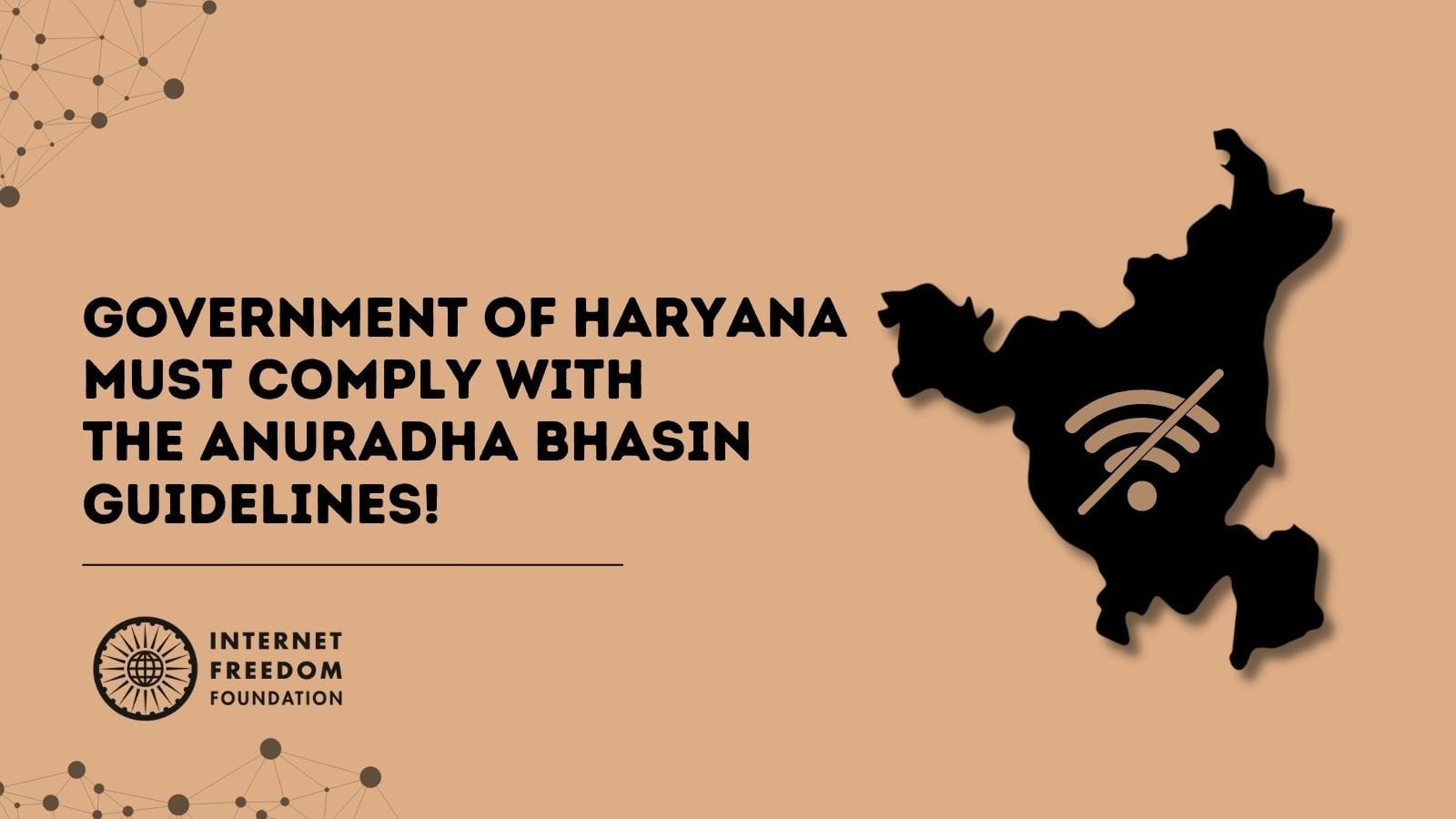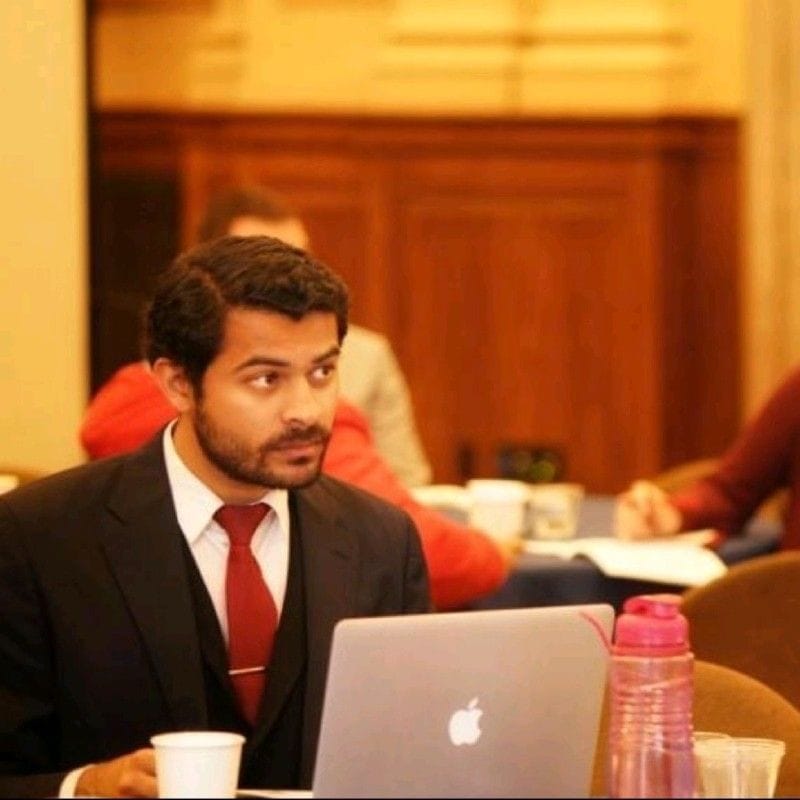
tl;dr
Between September 7, 2021 and midnight of September 9, 2021, internet services were suspended in four districts of Haryana due to ongoing farmers’ protests. The order has been circulating on social media, but is not available on the Government websites. The order does not lay out a factual justification for why the internet suspension is required, and does not justify the geographical extent of the suspension either. We wrote to the Haryana government to officially publish all orders related to the current internet shutdowns in the state and proactively publish any subsequent internet shutdown orders in compliance with the Supreme Court of India’s judgment in Anuradha Bhasin v. Union of India (2019).
Background
On September 6, 2021, on the twitter account of a media group, we came across an image of an purported Order No. 2/1/2021-1H(C) dated September 6, 2021 (the “Impugned Order”) under Rule 2 of the Temporary Suspension of Telecom Services (Public Emergency or Public Safety) Rules, 2017 (the “Telecom Suspension Rules”) to suspend mobile and internet services for 24 hours in four districts of Haryana on September 7, 2021, i.e. Kurukshetra, Kaithal, Jind & Panipat, in the wake of a call for a Kisan Mahapanchayat on September 7, 2021 in Karnal.
We were able to access the Impugned Order only through a media account on Twitter, since it is not available on the websites of the four districts (https://kurukshetra.gov.in, https://kaithal.gov.in, https://jind.gov.in, or https://panipat.gov.in), or on the Government of Haryana’s website (https://haryana.gov.in). The Home Ministry of Haryana’s website (https://www.homeharyana.gov.in) was inaccessible for the entire day on September 7, 2021. While the Home Ministry’s website became accessible on September 8, 2021, the Impugned Order was not available there as well.
As a result, we wrote to the Secretary, Home, who had ordered the internet suspension, asking him to ensure that the Impugned Order is uploaded at the earliest. We also asked that all such orders of internet suspension are proactively uploaded on official government websites, and widely circulated in the media. This is a crucial aspect of the Anuradha Bhasin guidelines.
The Anuradha Bhasin guidelines allow internet suspension in limited circumstances
After hundreds of days of internet shutdown in J&K, the Supreme Court, in Anuradha Bhasin v. Union of India, held that the exercise of fundamental rights through the internet was protected by the Constitution. Specifically, the Court stated the right to freedom of speech and expression under Article 19(1)(a) and the right to practice any profession or carry on any occupation, trade or business under Article 19(1)(g) were guaranteed over the internet. This means that any restriction on internet access must have a publicly disclosed legal basis and it should be temporally and territorially limited in scope to satisfy the principles of legality, necessity and proportionality. The specific basis for this representation can be found in Paragraph 96 of the judgement where the Court stated:
“It must be noted that although the Suspension Rules does not provide for publication or notification of the orders, a settled principle of law, and of natural justice, is that an order, particularly one that affects lives, liberty and property of people, must be made available...” (emphasis supplied)
This is important. While the Supreme Court did not go so far as to say that the internet itself is fundamental right (though the Supreme Court did not hold that the internet is not a fundamental right either - the question was not simply not before the Supreme Court), it did hold that access to information over the internet is a fundamental right. As such, a suspension of the internet is a curtailment of one’s fundamental rights. Now, this is not to say that the internet can never be suspended, but that any such curtailment must be rare, absolutely necessary, and provide several safeguards.
From our past experiences (here, here, here, here, here, here, here, here, here, here, here), we know that internet shutdowns are not rare. Indeed, India has become the internet shutdown capital of the world. We also apprised the Haryana government that the internet suspension was not shown to be a necessity (more on that below). But first let’s see what the safeguards are that have been provided by Anuradha Bhasin, and whether they were followed by the Haryana government.
- Proactive publication of the internet suspension orders. According to the Supreme Court “Any law which demands compliance of the people requires to be notified directly and reliably.” Unfortunately, that has not been the case with the Impugned Order, which is not available on the websites of the State and district administrations, but available only on the twitter account of a media group. Non-publication or belated publication of orders hinders the ability of affected persons to challenge the orders before the High Court, undermines the directions of the Hon’ble Supreme Court, and violates the fundamental rights of the residents of the affected areas.
- Immediate appointment of a Review Committee. Rule 2(5) of the Telecom Suspension Rules necessitates the constitution of a Review Committee to assess whether the Impugned Order is within the narrowly defined procedural safeguards of the Rules. Further, the Hon’ble Supreme Court of India emphasised the need for a periodic review by the Review Committee to demonstrate a ‘public emergency’ or threat to ‘public safety’ under Section 5(2) of the Indian Telegraph Act, 1885. However, to the best of our knowledge, no official order or notification to constitute a Review Committee by the Haryana government has been made available yet.
‘Necessity’ was not established
The justification contained in the Impugned Order to impose an internet shutdown in four districts of Haryana on September 7, 2021 is incompatible with the Anuradha Bhasin Guidelines. The basis of an internet shutdown cannot be a vague apprehension of danger to property, as stated in paragraph 2. The Impugned Order apprehends “disruption of public utilities and safety, damage to public assets & amenities” and links it to the ability of the internet to “spread inflammatory material and false rumours”. However, it is important to note that ‘inflammatory material and false rumours’ can also be easily and effectively spread without the use of the internet, but individuals exposed to such material will not have access to the internet to determine the veracity of those rumours independently.
The Impugned Order also does not state how the organisation of a protest can lead to an apprehension of danger to public safety. No factual basis for the imposition of an internet shutdown is disclosed in the Impugned Order to justify any of the apprehensions mentioned therein. Other than the fact that the four affected districts are the bordering districts of Karnal, no justification in respect of each district is provided for the suspension of internet services, and accordingly, the Impugned Order also lacks a geographical nexus.
The Right to protest is a democratic right
It is well settled by the Supreme Court of India that the right to protest is an inalienable exercise of democratic and fundamental rights, including the right to freedom of speech and expression, guaranteed under Article 19(1)(a) of the Constitution. Internet services play a crucial role in the exercise of a citizen’s democratic right to protest peacefully, by enabling coordination, providing access to health and other services, and also by enabling crucial reporting of the protest by journalistic bodies.
To suspend internet services on a vague, tenuous and unsubstantiated apprehension that the protest “may adversely affect the public safety and law & order situation” is to violate the constitutional rights of the residents of the affected districts, and also of all citizens who may travel to the affected districts for whatever reason.
Accordingly, we formally called upon the Haryana Government to comply with the directions of the Hon’ble Supreme Court in Anuradha Bhasin v Union of India by undertaking the following measures:
- Refrain from issuing internet suspension orders, unless circumstances justify such suspension;
- Proactively publish all internet shutdown orders, including the Impugned Order, on official government websites and widely disseminate them through the media; and
- Ensure the appointment of a Review Committee at the earliest and facilitate the mandatory review of the Impugned Order and its extension orders, if any, within the narrowly defined safeguards as established by the Hon’ble Supreme Court of India.
We are hopeful that our suggestions would be taken into consideration by the Haryana government. IFF will continue to strive towards greater compliance with the directions of the Supreme Court of India and advocate towards realising the principles enshrined in the Anuradha Bhasin judgment into practice.
Important Links
- Representation to the Govt. of Haryana seeking compliance with the Anuradha Bhasin judgment (Link)
- Summary of judgement in Anuradha Bhasin v. UoI (Link)

